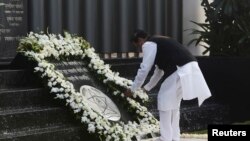NEW DELHI —
India Tuesday marked the fifth anniversary of the 2008 Mumbai terror attacks that killed 166 people. The anniversary comes amid concerns that the country is still vulnerable to similar attacks mounted from the sea. Indian authorities also are still waiting for the alleged Pakistan-based planners of the attack to be brought to justice.
At a memorial in South Mumbai, Maharashtra Chief Minister, Prithviraj Chavan, and other leaders paid homage and laid floral tributes to the men and women who fell victim to the ten terrorists who sneaked into Mumbai in a fishing trawler five years ago.
The city had reeled under the sound of gun shots for 60 hours as they assaulted multiple targets - two five star hotels, a popular café, a rail station and a Jewish Center.
As that trauma recedes, Mumbai went about business as usual on Tuesday. The city’s Police Commissioner, Satyapal Singh, said they have traveled a long journey since then.
“We are much better prepared today in terms of anti-terror measures, counter terror measures,” said Singh.
Coastal security still a concern
Despite efforts since the attacks to revamp coastal security, many remain concerned that the country is still vulnerable to similar attacks.
Local media reported that Maldives recently tipped off Indian authorities about an alleged plan for a Mumbai-style attack on a southern port city.
Counter terrorism experts say coastal police infrastructure has been upgraded, surveillance intensified and patrol boats purchased in recent years.
But Ajay Sahni who heads the Institute for Conflict Management in New Delhi worries that the most crucial step, a Global Positioning System to identify all vessels on a radar system and detect illegal movement of ships and boats, has not been put in place.
“Unless you are able to identify all vessels that are legitimately on Indian waters, you cannot identify any vessel that is illegitimately there or deviating from its declared path and purpose. So what are you going to do running around with speed boats and helicopters and surveillance planes? What are you looking for? This most rudimentary element has not been implemented,” said Sahni.
Call for justice in Pakistan
The anniversary also led to renewed calls that Pakistan mete out justice to the alleged planners of the Mumbai attacks. New Delhi says they were masterminded by top leaders of the Islamic terror group, Lashkar-e-Taiba.
Pakistan has put seven men on trial for their role in the attacks.
In Islamabad, lead counsel for the accused, Rizwan Abbasi, this week said the case against his clients is thin.
“Ultimately, it will be decided by the court but these evidences are sham in nature,” said Abbasi.
The issue continues to sour relations between the rivals as India accuses Islamabad of stalling on the trials.
On the eve of the anniversary, Defense Minister A.K. Antony said India has taken up the issue with Islamabad many times.
“We have already explained our position. They should book the culprits,” said Antony.
India’s ambassador to Pakistan said recently progress in the trial is important for Indian public sentiment.
At a memorial in South Mumbai, Maharashtra Chief Minister, Prithviraj Chavan, and other leaders paid homage and laid floral tributes to the men and women who fell victim to the ten terrorists who sneaked into Mumbai in a fishing trawler five years ago.
The city had reeled under the sound of gun shots for 60 hours as they assaulted multiple targets - two five star hotels, a popular café, a rail station and a Jewish Center.
As that trauma recedes, Mumbai went about business as usual on Tuesday. The city’s Police Commissioner, Satyapal Singh, said they have traveled a long journey since then.
“We are much better prepared today in terms of anti-terror measures, counter terror measures,” said Singh.
Coastal security still a concern
Despite efforts since the attacks to revamp coastal security, many remain concerned that the country is still vulnerable to similar attacks.
Local media reported that Maldives recently tipped off Indian authorities about an alleged plan for a Mumbai-style attack on a southern port city.
Counter terrorism experts say coastal police infrastructure has been upgraded, surveillance intensified and patrol boats purchased in recent years.
But Ajay Sahni who heads the Institute for Conflict Management in New Delhi worries that the most crucial step, a Global Positioning System to identify all vessels on a radar system and detect illegal movement of ships and boats, has not been put in place.
“Unless you are able to identify all vessels that are legitimately on Indian waters, you cannot identify any vessel that is illegitimately there or deviating from its declared path and purpose. So what are you going to do running around with speed boats and helicopters and surveillance planes? What are you looking for? This most rudimentary element has not been implemented,” said Sahni.
Call for justice in Pakistan
The anniversary also led to renewed calls that Pakistan mete out justice to the alleged planners of the Mumbai attacks. New Delhi says they were masterminded by top leaders of the Islamic terror group, Lashkar-e-Taiba.
Pakistan has put seven men on trial for their role in the attacks.
In Islamabad, lead counsel for the accused, Rizwan Abbasi, this week said the case against his clients is thin.
“Ultimately, it will be decided by the court but these evidences are sham in nature,” said Abbasi.
The issue continues to sour relations between the rivals as India accuses Islamabad of stalling on the trials.
On the eve of the anniversary, Defense Minister A.K. Antony said India has taken up the issue with Islamabad many times.
“We have already explained our position. They should book the culprits,” said Antony.
India’s ambassador to Pakistan said recently progress in the trial is important for Indian public sentiment.




